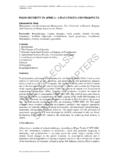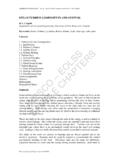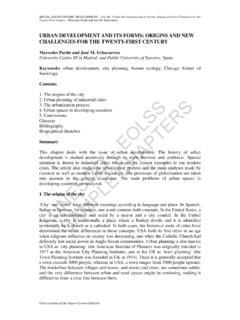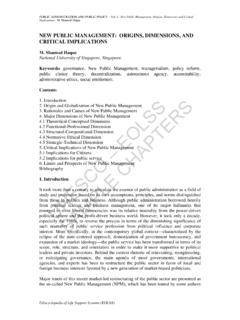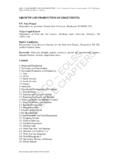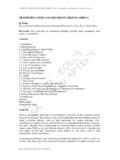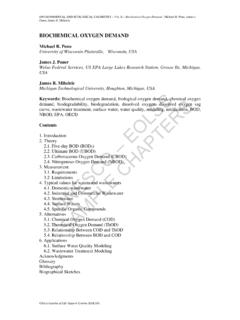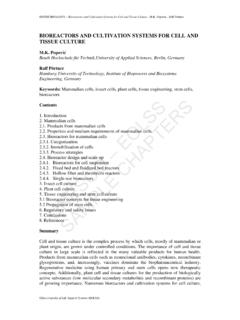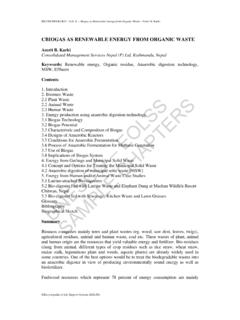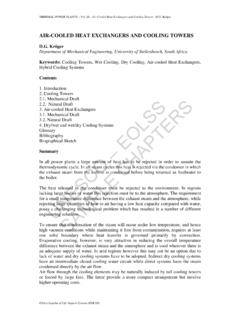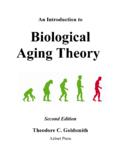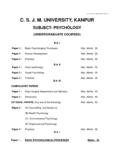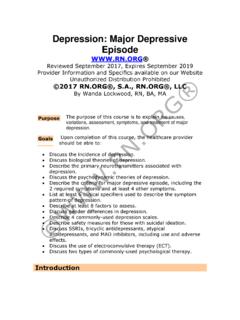Transcription of The Developmental Psychology of Aged Persons
1 UNESCO EOLSSSAMPLE CHAPTERSPSYCHOLOGY - Vol .II - The Developmental Psychology of aged Persons - Jeffrey S. Akman Encyclopedia of Life Support Systems (EOLSS) THE Developmental Psychology OF aged Persons Jeffrey S. Akman Department of Psychiatry and Behavioral Sciences, George Washington University, Washington, , USA Keywords: Aging, gerontology, geriatrics, old age, later life, retirement, Psychology , mental health, psychological adjustment, role transitions, Developmental stages, Developmental tasks, disease, illness, social function, coping, adaptation, nervous system, bereavement, death, neuropsychology, cognition, intelligence, reminiscence, life review, personality development, defensive processes Contents 1.
2 Introduction 2. Definitions 3. Physical Aspects of Aging Vision Hearing Nervous System Disease and Illness 4. Cognitive Aging Attentional Processes Language Functions and Verbal Abilities Learning and Memory Processing Speed Executive Functions Models of Cognitive Aging 5. Mental Health and Personality Mental Health Over the Life Span Stage Theories of Personality Development Reminiscence and Life Review 6. Adjustment and Coping Developmental Tasks and Aging Defensive Processes and Aging Coping Strategies and Coping Effectiveness 7.
3 Role Transitions Retirement Psychological Consequences of Illness Caregiving Spousal Bereavement Facing Death Resilience 8. Social Functioning in Late Life Glossary Bibliography Biographical Sketch UNESCO EOLSSSAMPLE CHAPTERSPSYCHOLOGY - Vol .II - The Developmental Psychology of aged Persons - Jeffrey S. Akman Encyclopedia of Life Support Systems (EOLSS) Summary This article reviews the main findings in the Psychology of later life. It looks at a definition of old age and then reviews the main physical and cognitive changes, before moving on to look at mental health, personality, and psychological development.
4 This article then reviews what is known about emotional adjustment and coping in later life, focusing on major transitions and losses that are frequently seen in old age. Finally, social functioning in old age is examined. From this review it is apparent that old age may be a time with significant challenges, especially for those with health problems, but it is not a time when quality of life and adjustment are inevitably poor. While acknowledging that there exists a significant degree of heterogeneity in the elderly population, studies of mental health over the life span, coping and adjustment, and personality often fail to reveal any significant age effects when other factors are controlled.
5 In addition, research has revealed often-surprising resilience in older adults. The important exception to some of these conclusions may be individuals over the age of 85 where social isolation may be a more significant problem. 1. Introduction Remarkable improvements in health care, medicine, and living conditions have led to a dramatic increase in the numbers of Persons reaching old age. These improvements will translate into significant increases in those over the age of 65 and, most strikingly, in the population of the oldest-old: those over 85 years of age.
6 Consistent with this large increase in the number of Persons reaching old age has been the growth in the fields of gerontology and geriatric medicine that has led to an astonishing amount of research and scholarship related to aging. Aging refers to the process of becoming old, with the study of human aging usually concentrating on the later years of life. This article is concerned with psychological aspects of the process of becoming older, from about the sixth decade through to the end of life.
7 It examines normal aging and its impact on physical, cognitive, emotional, and social aspects of functioning. The article begins with definitions of old age. It then reviews physical and cognitive changes in later life and the challenges that these present for older people in terms of psychological adjustment. Aspects of mental health, personality, and theories of psychological development are introduced, before moving on to describe what is known about adjustment and coping with role transitions and loss.
8 Finally, social functioning in later life is discussed. 2. Definitions One of the major points of this article is that despite all the challenges associated with aging, with the exception of cognitive processes, age per se is rarely an important predictor of outcome related to mental health, coping and adjustment, and personality. UNESCO EOLSSSAMPLE CHAPTERSPSYCHOLOGY - Vol .II - The Developmental Psychology of aged Persons - Jeffrey S. Akman Encyclopedia of Life Support Systems (EOLSS) Yet, in discussing Developmental Psychology in the aged , it is still important to have a set of definitions of the period of life to be addressed.
9 Chronological age (how old a person is) is commonly used to define an age band of older adults. The start of the period of later life is not fixed and in many Western societies 60 65 is looked upon as the threshold of old age. The reason for this is possibly related to societal norms ( retirement age) and to an age at which degenerative changes of aging become noticeable. The age band of 65 years to 100 years or more is certainly very broad.
10 It includes a range of 30 40 years, which is obviously more than one generation. Accordingly, the final stages of life can be subdivided into young-old (60s), middle-old (70s), and old-old (80+ years), or young-old (65 75 or 80), old-old (75 80 to 90), and very old (90+). An additional way of defining age is to use functional age to assign a person a functional age depending on their performance in relation to age-graded norms. Thus, a person might have a chronological age of 70 (be 70 years old) but have a functional age of 50 for reaction time and of 60 for speed of information processing.
